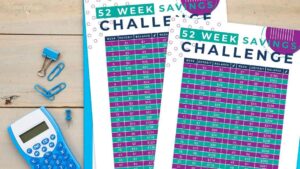Creating a budget starts with knowing where your money is going. Many people struggle to save money because they don’t keep track of their spending. If you don’t have a clear picture of your income and expenses, chances are you’ll overspend and wonder why you’re left with nothing at the end of the month. A budget can assist you in managing your finances by providing a clearer understanding of your income, expenses, and the items you spend your money on. By understanding your financial habits, you can make better choices, reduce waste, and find room to save regularly.
Create a Realistic Spending Plan
A budget is about planning your finances, not restricting your lifestyle. Every dollar has a purpose, so you want to make sure your money is serving your goals. The strategy involves setting aside a budget for essential expenses like rent, groceries, and utilities, as well as savings and even entertainment. If your spending plan reflects your priorities, you’re more likely to stick to it. A budget helps you make sure you have enough money for important purchases and prevents impulse buys.
Identify and Reduce Unnecessary Expenses
A budget’s main benefit is that it shows where you may be overspending. Small daily habits, such as eating out more often or buying coffee, can cost you a lot of money over time. When you look at your monthly expenses, you can identify unnecessary expenses and start cutting them. Over time, these small changes can add up to significant savings. Creating a budget can help you manage your money better. It gives you the space to save without feeling uncomfortable or deprived.
Set Reasonable Savings Goals
Budgets help you identify and achieve your financial goals. Whether you decide to save for a vacation, build an emergency fund, or buy a new car, your budget will give you a guideline. Knowing how much you can actually save each month can help you avoid disappointment and frustration. Setting clear goals also motivates you. You start by budgeting your money instead of saving what you have left at the end of the month. This proactive strategy has led to steady growth and better financial management.
Encourage Smart Consumption
When people are on a tight budget, they often turn to loans or credit cards. This makes it even harder to pay off the debt. A budget allows you to prepare for expected and unexpected expenses, which reduces the amount of money you have to borrow. It encourages smart purchasing by forcing you to think twice before buying something. Knowing how much money you are putting aside for specific categories helps you stay within your limits. Avoiding unnecessary debt can help you save more because you won’t always have to deal with late fees or interest.
Develop a Habit of Financial Discipline
Budgeting creates discipline, a key factor for long-term financial success. Saving money requires constant effort and discipline, just like eating healthy and exercising regularly. A budget allows you to prioritize, postpone fun things, and make informed decisions. Over time, these behaviors become natural and have a lasting impact on your financial future. By incorporating a budget into your daily or weekly planning, you can strengthen your relationship with money and lay the foundation for growth and stability.
Dealing with Variable or Irregular Income
Many people with irregular incomes think that budgeting is irrelevant, but in reality, it is much more important. A budget can help you balance the highs and lows of commissions, seasonal work, or freelance work. By estimating your average monthly income and creating a budget based on your minimum income, you can avoid overspending during the months when you have a high income. Creating a budget based on your fluctuating income also encourages you to save during good times, giving you a buffer for difficult times. It increases predictability and reduces anxiety.
Encouraging Communication in Households
Living with a partner or family can lead to more open conversations about money through budgeting. One of the biggest sources of stress in a relationship is financial conflict. Creating a budget together gives everyone the same understanding of income, expenses, and savings goals. It becomes easier to make shared choices, avoid conflict, and create shared financial success. Budgets promote openness and ensure that everyone contributes honestly and fairly to the well-being of families.
Change and Grow Over Time
Your budget evolves with your life; it is not a one-time job. Your budget should change as your income, expenses, and goals change. Regularly reviewing and changing your budget can help you stay on track and adapt to changing circumstances. A pay raise can help you save more money. A small setback can help you cut back on unnecessary expenses. Budgets are personal and adaptable. With practice, you can strengthen your knowledge and become more confident in the financial choices you make.
Conclusion
A budget is a powerful tool that can help you save more money each month without feeling limited. It can bring clarity, order, and purpose to your financial life. Creating and following a budget can help you stay on top of your spending, cut down on unnecessary expenses, and prioritize saving. Budgeting can lead to long-term financial stability, less stress, and more freedom. Whether you’re just starting out or want to get better at money management, budgeting is the first step toward achieving your financial goals and creating the life you want.
FAQs
1. Why use a budget to save money?
A budget helps you monitor your spending, manage expenses, and consistently set aside money. It helps ensure you have a clear strategy and prevents you from overspending.
2. How do I start budgeting if I’ve never done it before?
Start by listing all your expenses and income. Group them together and set reasonable limits. Use an app, spreadsheet, or just pen and paper to keep track of your monthly budget.
3. Can I still live well on a budget?
Of course, a budget doesn’t mean you can’t have fun. It’s about planning your leisure activities and other goals so you can live a guilt-free, debt-free life.
4. What if my income isn’t enough to save?
Every point counts. Regardless of your income, a budget can help you identify opportunities to cut costs.
5. How often should I review my budget?
It’s ideal to review your budget monthly. This way, you can make changes as needed and continue to achieve your financial goals.




